

© 2025 Always Buying Scrap! • All Rights Reserved • Website by Chariot
This site protected by reCAPTCHA and the Google Privacy Policy and Term of Service apply.
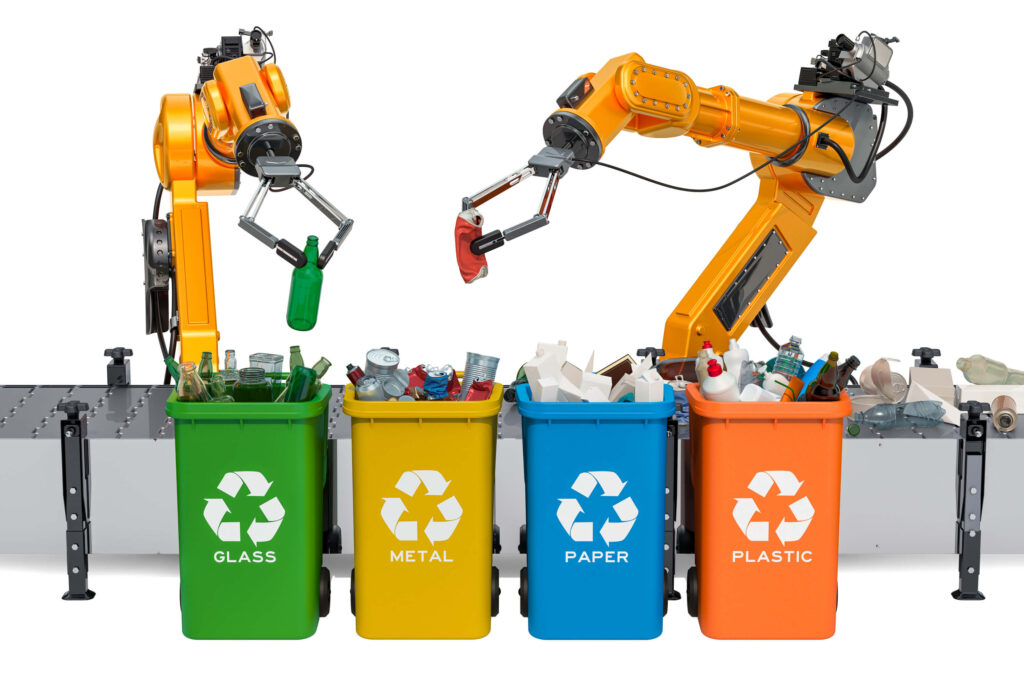
The growth of Artificial Intelligence (AI) has accelerated exponentially in recent years due to continuous research and innovation. AI offers businesses numerous advantages, such as reduced costs, new job creation, improved productivity, and better decision-making capabilities.
By 2022, the market size of AI soared to USD 136.55 billion and is forecasted to grow at a CAGR of 37.3% from 2023 to 2030. With its wide range of applications across various industries, such as automotive, healthcare, retail, finance, and manufacturing, AI promises vast opportunities for businesses looking to benefit from this technology. The Scrap Recycling industry is a massive yet technologically underdeveloped sector that has the potential to benefit immensely from AI.
As metal recyclers grapple with the complexities of managing their operations, AI is being used to help make more informed and profitable decisions. AI helps them analyze large volumes of data – including prices, supply and demand, and trade patterns – far faster than any human could do. Recyclers use this data to swiftly identify trends and make accurate predictions about future market conditions that could impact their profits.
Staying ahead of the curve is crucial for achieving success in the metal recycling industry. AI provides recyclers with a powerful tool to gain insights into market sentiment and predict shifts in the market before they happen. By leveraging AI-driven analysis of news articles, social media posts, and other texts related to the industry, recyclers can make proactive decisions that will keep them competitive.
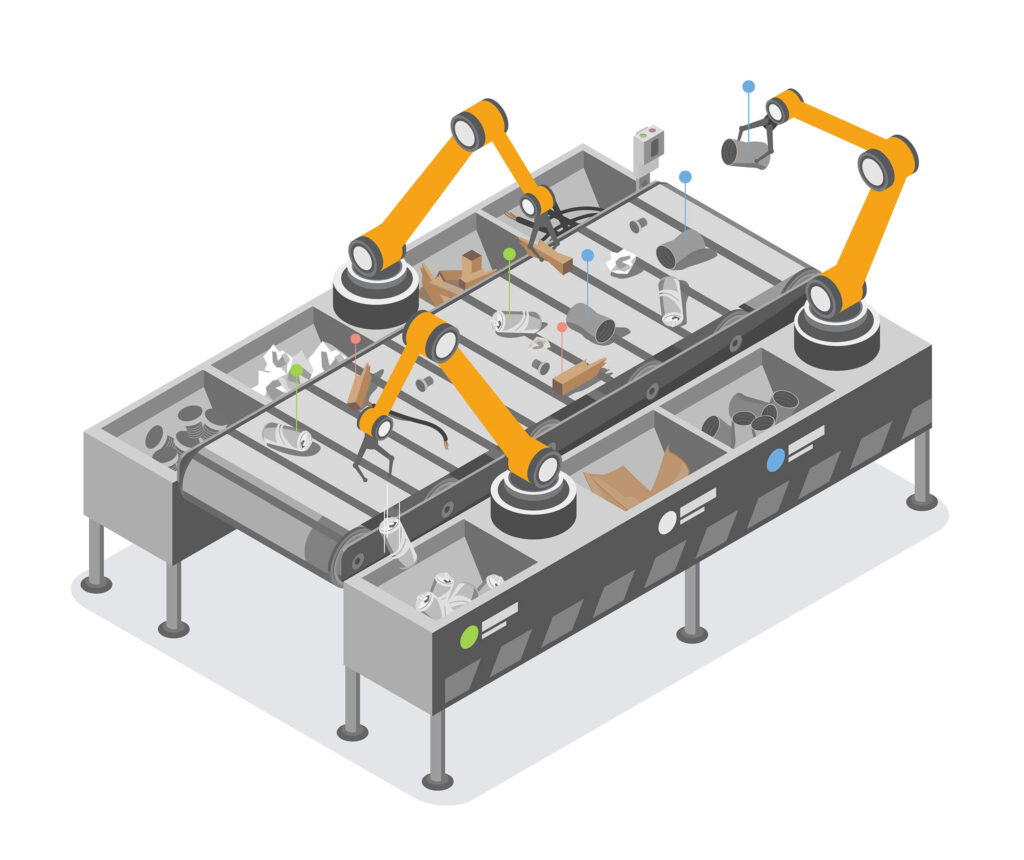 Over the last several years, the waste management industry has shifted towards automating procedures, starting with the collection process. AI smart bins, for example, use sensors and cameras to monitor waste levels, detect contamination, and optimize collection schedules to improve resource allocation and reduce unnecessary pickups. By learning from historical data through machine learning algorithms, these smart bins can provide valuable insights into waste generation and future demand patterns that would otherwise be impossible to predict, achieving cost savings while also reducing the negative impact on the environment.
Over the last several years, the waste management industry has shifted towards automating procedures, starting with the collection process. AI smart bins, for example, use sensors and cameras to monitor waste levels, detect contamination, and optimize collection schedules to improve resource allocation and reduce unnecessary pickups. By learning from historical data through machine learning algorithms, these smart bins can provide valuable insights into waste generation and future demand patterns that would otherwise be impossible to predict, achieving cost savings while also reducing the negative impact on the environment.
In the past, human error and inefficiency have limited the recycling process. AI technology makes it possible to automate the sorting process with unprecedented accuracy, helping to identify metals quickly and efficiently. AI ensures that recycled products meet quality standards by detecting impurities, measuring material composition, and identifying defects. AI sorting capability improves recycling rates by minimizing contamination and providing higher-quality recycled materials.
Deep Learning is a form of AI that uses multiple layers of deep neural networks to learn from large amounts of data. This advanced technology isolates high-level features from raw input, enabling machines to identify patterns, make decisions, and even create new ideas based on what it has learned. It allows for a high level of recovery and accurate sorting of materials that dwarfs conventional technology. Deep-learning robots analyze materials much in the same way humans do. Using cameras and sensors, they scan the optical signature of recyclable materials by texture, color, material type, and product application. For example, AI can discern between:
It can also differentiate metals and contaminants such as:
Thanks to AI technology, it’s now possible to recover and reuse valuable metals like aluminum, which is currently experiencing a shortage. With AI, recycling facilities can retrieve more materials with higher purity levels, increasing recycling rates and reducing reliance on virgin materials.
Glacier, a San Francisco-based tech company, is developing a cutting-edge AI algorithm that can accurately detect over 90% of recyclable items in waste streams. The company specializes in developing customized solutions that select and sort specific materials.
EverSteel, a promising startup from the University of Tokyo, has focused on automating scrap metal sorting processes using AI. It accomplishes this by using computer vision systems, which can accurately classify scrap metal into over 20 categories and remove unrecyclable alloys and irregular material. These systems help to save precious time and effort for the human workers who come in later to complete the task. EverSteel technology is so innovative that they had to create their own data set to train their models.
EverestLabs, an organization that employs RecycleOS technology, fuses robotics and AI to substantially increase recycling facilities’ material recovery rate. RecycleOS’s cutting-edge AI models can precisely identify nearly indistinguishable objects. When compared with manual sorting, RecycleOS’s robots can perform twice the work in the same span of time.
ZenRobotics‘ Heavy Picker uses specific characteristics like shape or color to identify essential metals such as:
It can also specify objects like:
Scrap metal processing companies like Skrotfrag in Sweden have already employed ZenRobots. Skrotfrag’s sorting line uses Heavy Pickers from ZenRobotics, each with three arms. They stand out as one of the first companies in Sweden to apply robotic sorting technology to scrap metal.
AI robots, like AMP Cortex by AMP Robotics, offer drastic improvements in labor rates. These robots operate at lightning-fast speeds, sorting, picking, and placing materials with up to 120 picks per minute and 99% accuracy rates. Plants adopting the AMP system have reported an impressive 60% rise in labor efficiency and an 11% increase in recyclables capture. The impeccable efficiency of these robots allows them to accomplish in three hours what would take human sorters an entire workday to complete. The operation can accept materials other recycling plants can’t process and keep the whole process in-house. By replacing hard-to-secure human labor for sorting roles, the AMP robots offer facilities unmatched savings of up to 50-70%.
Unlike humans, AI robots can work around the clock, operate continuously without fatigue, and require minimal maintenance. Companies can rely on their consistency to quickly recover high-quality commodities. Robots are flexible machines that can adapt to changes in material streams and commodity prices, making them an essential asset in the recycling industry. With minimal training and refinement, robots can improve their performance over time, becoming more efficient and effective at sorting materials. Additionally, robots can multitask and target a broad range of materials, including challenging or hazardous items that may not be suitable for human workers.
AI and robotics have significantly reduced risks associated with handling hazardous materials at Metal Recycling Facilities (MRFs). Adopting AI in such facilities has also decreased the need for extensive safety training of human operators for working equipment and machinery, thereby reducing training overhead. Moreover, AI technology can help flag potential health and safety issues for operators, such as detecting aerosol bottles, propane and oxygen tanks, batteries, and ammunition, which can explode and cause fires.
MRFs can strategically deploy AI and robotics technologies to optimize their workforce, reallocating human workers to areas where their unique capabilities can add the most value. MRFs can save time and money on manual sorting by replacing lower-value, labor-intensive, or high-risk roles with AI-driven automation, allowing for streamlined operations. In the waste and recycling industry, there is a trend toward reducing the need for humans to work in sorting positions. Instead, the focus is on shifting towards supervisory and maintenance roles, which allows employees to progress into higher-skilled positions.
Companies are currently utilizing AI technology to develop apps that allow for quick categorization and pricing of scrap metal. Integrated Recycling Technologies (IRT) is developing a circuit board classification app to identify and analyze 75 board characteristics, including serial numbers and chip types, to determine their respective categories. As more images are uploaded, the deep-learning capabilities of the system will expand, allowing for a more comprehensive grading of the boards. IRT has enlisted the expertise of external engineers specialized in high-definition cameras, facial recognition software, and deep-learning technology to create a system that automates the grading and valuation process. Although the software was initially created for suppliers, the company will use it to manage its own circuit board sorting system.
Tecnoap, an esteemed company with three decades of expertise in the steel manufacturing industry, recently introduced its own AI software – SCRAPYARD – an innovative web-based platform dedicated to efficiently managing and classifying scrap metal. SCRAPYARD uses AI, sensors, and machine learning technologies to optimize operations on it’s platform. Advanced vision analytics organize different types of scrap metal, verify the weight of truckloads, determine load density, and accurately document the location of unloaded materials. The platform effortlessly generates a comprehensive digital file for each entry, capturing all the necessary details the supplier provides. By harnessing the power of AI, Tecnoap strives to enhance reliability and transparency, ensuring the eradication of fraudulent practices.
According to recent analyses, certain AI units have the potential to achieve breakeven for investment in just under a year, highlighting the tremendous potential for profitability within the scrap metal industry. MRFs can generate significant profits within months following the installation of technologies such as RecycleOS, which streamline the recycling process and greatly enhance efficiency. However, it’s important to note that the payback period for such investments can vary depending on its specific application, for example, its utilization in data analysis, maintenance, or replacing human sorters.
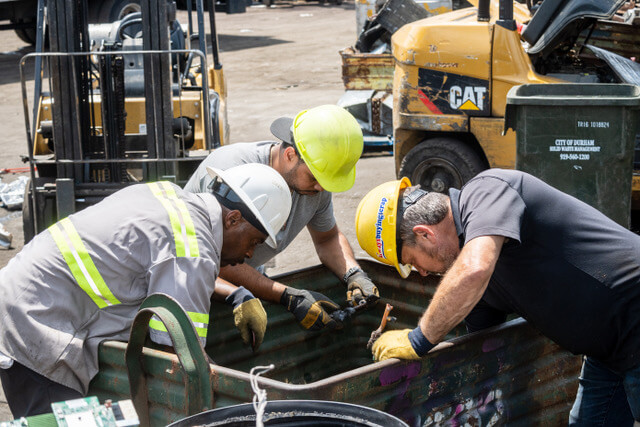 The scrap metal industry offers a variety of jobs to suit all experience levels.
The scrap metal industry offers a variety of jobs to suit all experience levels.Whether you’re just starting out or looking for a career change, the opportunities available can lead to a rewarding job. From general labor to salespeople to experienced equipment operators and truck drivers, quality skills will be met with pay increases as you progress in the industry.
Moreover, jobs in the industry provide physical activity for those looking for a more hands-on career and the flexibility to work indoors or outdoors depending on the day-to-day tasks.
There are many jobs that the scrap recycling industry provides. These include:
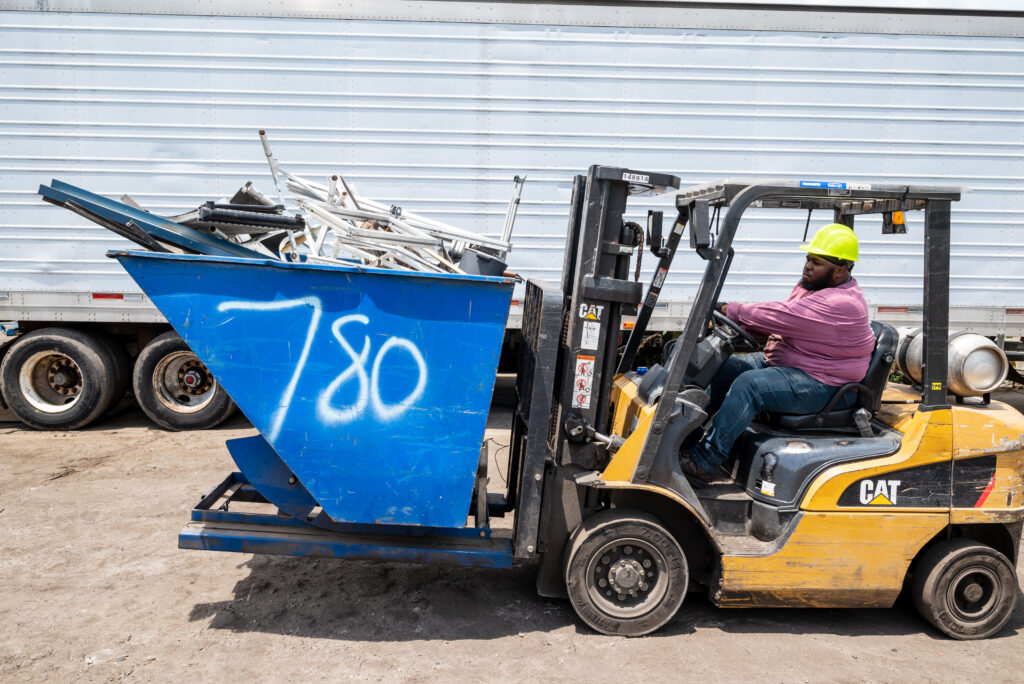 Over the years, jobs in the scrap metal recycling industry have become much safer for workers thanks to increasingly stringent protocols developed to ensure a safe work environment. Workers are taught to employ proper storage, containment, and handling activities to minimize potential workplace hazards. Many organizations such as OSHA, EPA, DEQ, and DOT are involved in regulating safety standards in the scrap metal industry.
Over the years, jobs in the scrap metal recycling industry have become much safer for workers thanks to increasingly stringent protocols developed to ensure a safe work environment. Workers are taught to employ proper storage, containment, and handling activities to minimize potential workplace hazards. Many organizations such as OSHA, EPA, DEQ, and DOT are involved in regulating safety standards in the scrap metal industry.
The scrap metal recycling industry is an important and often overlooked contributor to the economy. Managers of these operations have worked hard to create jobs and business opportunities that positively impact the environment and the economy.
In 2021, jobs in the scrap metal recycling industry supported 506,000 people directly and indirectly, equating to over $117 billion in economic contribution.
An astonishing 130 million metric tons of valuable commodities were processed annually, with North Carolina alone providing jobs to 15,000 employees while collecting 300k in taxes.
2022 data has yet to be compiled, but expectations are high, with forecasts indicating an increased job growth rate due to the improved stability of supply chains after the COVID pandemic. The scrap metal recycling industry provides essential work for people across the country and is invaluable for local economies.
Always Buying Scrap is a proud employer of over a dozen employees. We are often hiring for one or more positions. Please see our listings for available job openings.
Are you an air conditioning company looking to maximize efficiency and increase your bottom line?
If so, let us be your scrap guys!
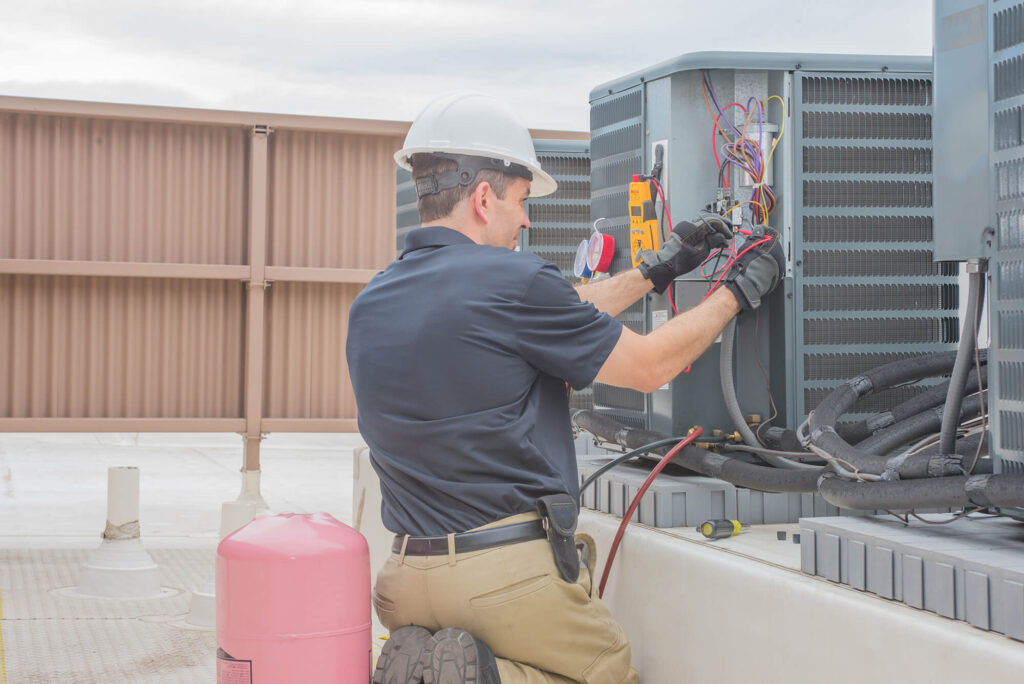 When it comes to HVAC recycling, you can’t go wrong by partnering with the experts at Always Buying Scrap. We provide efficient and professional scrap recycling services so your technicians can focus on their job without worrying about dismantling old units – leaving them more time to install new equipment or perform services as needed.
When it comes to HVAC recycling, you can’t go wrong by partnering with the experts at Always Buying Scrap. We provide efficient and professional scrap recycling services so your technicians can focus on their job without worrying about dismantling old units – leaving them more time to install new equipment or perform services as needed.
Our team offers prompt service and pays by ACH, check, or cash for chillers, window units, split units, air handlers, heat pumps, and ducting (insulation included), as well as scrap items such as motors, copper tubing, brass fittings, steel components, compressors, coils, unit cases, and more.
We recycle equipment from hospitals, arenas, stadiums, warehouses, schools, residences, and all types of commercial projects. We are committed to helping our clients reduce overhead costs while minimizing waste and maximizing profits.
At Always Buying Scrap, we understand the importance of prompt and reliable scrap recycling services, which is why we offer our clients a wide range of solutions. Our team will put a professional-looking roll-off container on your job site to meet your needs in a timely manner. This way, you don’t have to worry about theft or wasting time and resources hauling your scrap.
When you partner with us, we guarantee reliable service every time. We will work directly with your project managers or install teams to ensure that our roll-off containers are onsite at the appropriate times to meet your crane schedule. This means you don’t have to worry about delays or disruptions in service – we will always be there when you need us!
We are proud to offer responsible disposal practices that divert 100 percent of air conditioning units away from landfills. This means that all materials used in the AC unit can be recycled and reused in new products rather than sitting in a landfill for hundreds of years. By choosing our services, you can trust that any air conditioners removed from your property are disposed of responsibly and ethically. You can rest easy knowing you are helping the environment.
Our rates are designed to be competitive so that you get the best possible value for your money when it comes to recycling scrap. Our team is here to provide guidance so that you can make informed decisions about which services are right for your needs.
The staff at Always Buying Scrap are highly trained professionals with extensive experience in all aspects of HVAC recycling. Our team has access to the most modern technology, which enables us to provide the highest quality advice and services tailored to your individual requirements. With us on your side, you know that everything is being handled professionally, so there is no need for unnecessary stress or hassle!
As an industry leader in HVAC recycling and air conditioning removal services, Always Buying Scrap offers unbeatable customer service combined with dependable reliability and responsible disposal practices backed by well-trained staff members and modern technology. With our fast turnaround times and competitive prices, you can spend less time worrying about disposing of scrap materials to focus on what matters most – providing top-notch service to customers.
Contact us today to learn more about how we can help with your HVAC recycling needs!

As a family-owned business, we treat you with integrity and respect.


8:00am to 4:30pm
Last customer will be let in the gate at 4:15pm.
8:00am to 12:00pm
Last customer will be let in the gate at 11:30am.


© 2025 Always Buying Scrap! • All Rights Reserved • Website by Chariot
This site protected by reCAPTCHA and the Google Privacy Policy and Term of Service apply.